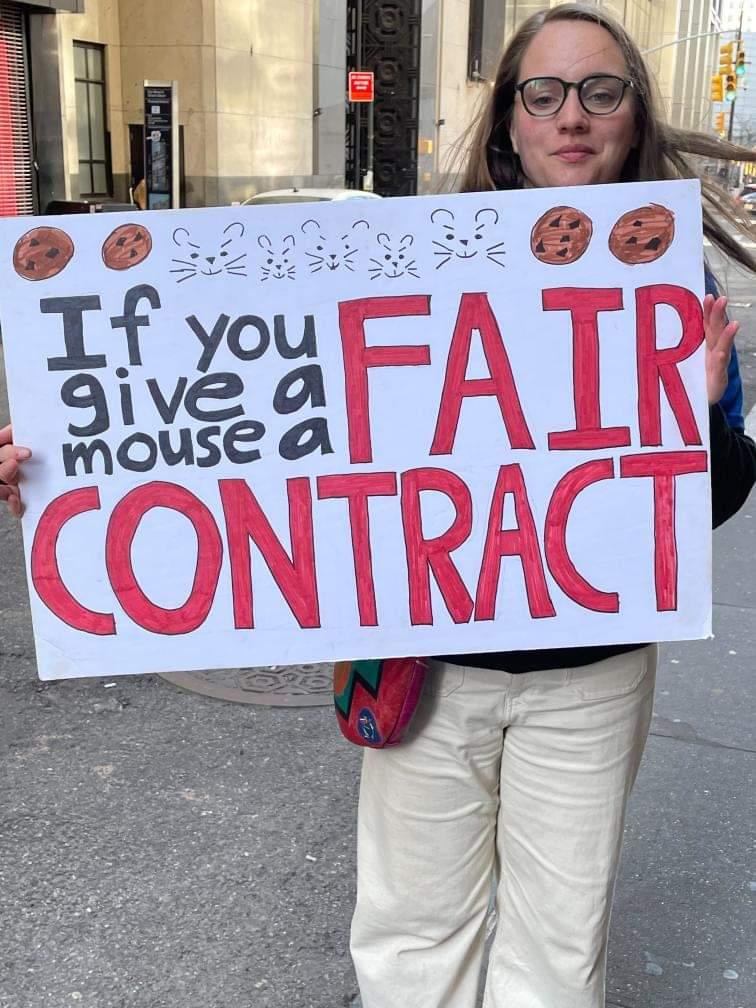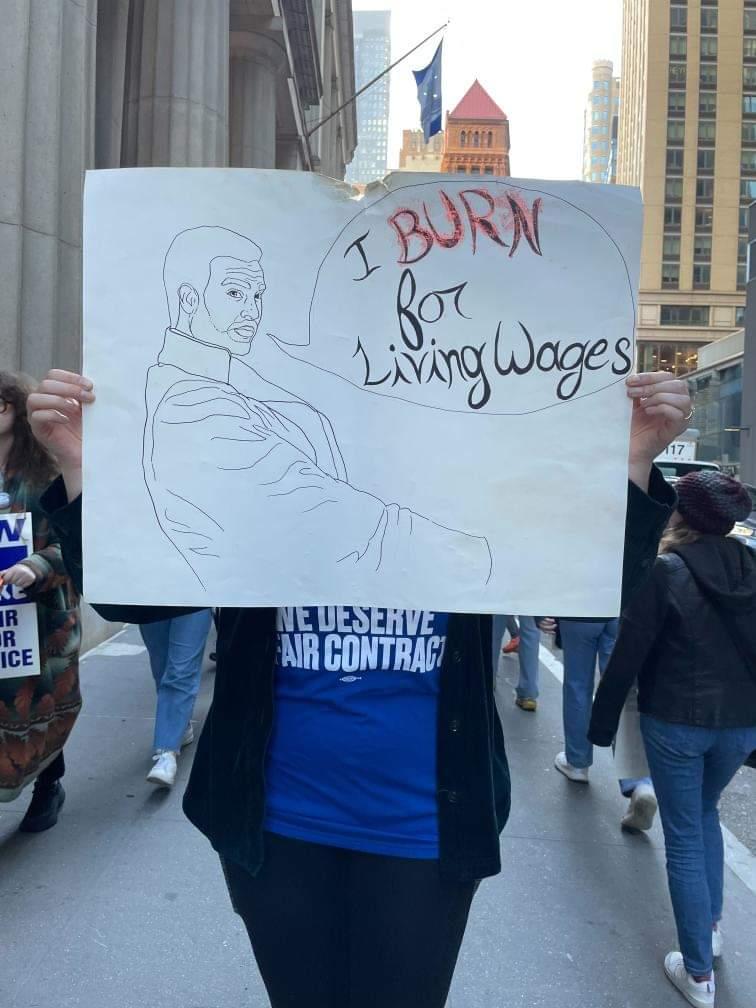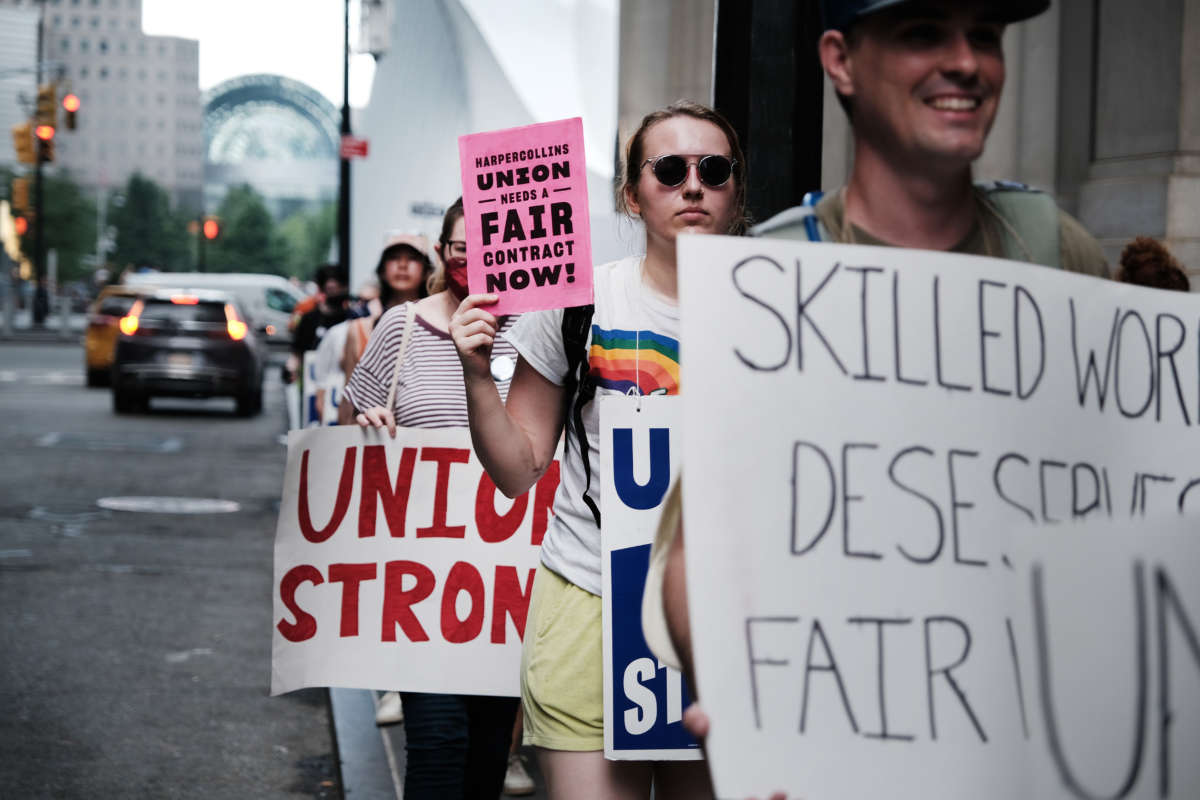On Thursday, HarperCollins’ unionized workers began an open-ended strike in protest of management’s refusal to agree to a fair contract. This open-ended strike comes a few months after a one-day strike the workers held this past July. Employees at one of the world’s largest publishing houses have been without a contract since April, and they have also filed an unfair labor practice charge with the National Labor Relations Board. The workers, who are represented by United Auto Workers Local 2110, are demanding that their contract include a living wage which accounts for inflation, and union security provisions. UAW 2110 represents some 250 HarperCollins employees.
I spoke to a HarperCollins worker on the picket line. “Management has made no moves towards a contract, and they’ve rejected all our proposals as not being realistic,” she told me. “We’re not talking about enormous sums of money here. We’re talking about a living wage.”
I am a worker in publishing and a member of UAW 2110, and after working in multiple non-union publishing houses, I’ve seen firsthand how essential organized labor is to an industry like publishing. A refrain on the HarperCollins picket line is “Passion doesn’t pay the rent!”

Management at HarperCollins claims that the company’s workers receive a fair and competitive salary, citing a recent 25 percent increase in entry-level salaries. This increase went into effect on January 18, 2021, following negotiations with the union on January 15, the previous Friday. What the company’s claim obscures, however, is that salaries were raised from $36,000 to $45,000, neither of which are fair or livable salaries for full-time workers, especially with inflation and rapidly rising costs of living. According to the same HarperCollins worker, management claims that this two-year-old salary increase is adequate and proof of the company’s goodwill, since management passed it “without concessions from the union.” Publishing workers are for the most part required to live in extremely expensive cities like New York and London — part of how the industry sustains itself is through its image of glamorous cosmopolitan erudition — and companies like HarperCollins, which have operated remotely throughout the pandemic, are now mandating that workers return to their offices.
At most publishing houses — particularly non-union houses — the hours are long, the workload is immense, and the pay is low; management dangles the dubious promise of career advancement in front of junior staff in order to squeeze more work out of them. This exploitation operates by leeching off the workers’ “passion for books.” The very same love and care for making books and supporting authors that publishing staff bring to their work is used against them, to worsen their working conditions. If someone expresses dissatisfaction with these conditions, she’s chastised for bringing vulgar material concerns into something so exalted as making and selling books — and reminded that there are a million fresh-faced recent college graduates clamoring for a job at a publishing house.

UAW 2110 president Olga Brudastova told Publishers Weekly, “Late last week, the company communicated to us over email that they are not interested in scheduling more bargaining sessions and are rejecting our latest proposal. We now get information that management is instructing non-union employees to avoid any mention of the strike and is planning to override our members’ out-of-office messages that mention it.”
In a leaked memo written to HarperCollins staff by a Senior Vice President of “HarperCollins Corporate Communications,” unionized employees are consistently referred to as “United Auto Workers” in anti-union tactic called “third-partying” — by casting actual employees of the company as outside agents, since they are represented by a union. The email states that “HarperCollins has implemented plans to ensure that operations continue uninterrupted during a potential strike.”
But it would appear that the workers have the support of the publishing world at large, and they’re hopeful they’ll win a fair contract. “The response from the community has been really positive,” this worker told me. “Authors have been writing to the company and posting on social media. They know what it takes to make a good book. And some agents have even been holding submissions…. There’s a lot of focus on us now from publishers. This is the most extreme thing we could do, but this is about all of us getting what we deserve.”
In October, after workers filed the unfair labor practice charge due to management’s refusal to respond to a request for information by the bargaining unit during negotiations, HarperCollins laid off an unspecified number of workers, including six union members. HarperCollins, which is owned by the Rupert Murdoch-founded parent company News Corp, made record profits during the fiscal year ending June 2022. Sales rose 10 percent over fiscal year 2021 — up to $2.2 billion. Despite this, News Corp cites inflation and supply chain costs for the layoffs and the modest salary increases — neglecting the impact of inflation on the underpaid workers that made these record profits possible.
HarperCollins workers are calling on the community to support the strike in a number of ways, including donating to the strike fund and writing to [email protected] to express solidarity with the striking workers. If you’re an author, freelancer, book reviewer, bookstagrammer, or agent, the workers are asking that you do not “cross the picket line” — hold your submissions to any HarperCollins editor until a fair contract is reached; don’t take HarperCollins contracts during the strike (but don’t renege on contracts either); and hold your reviews, blurbs, nominations, or any other coverage or content until workers get a fair contract. The publishing industry relies on its incredibly talented, brilliant, hardworking, and thoughtful workers to make the books that bring us such joy. It’s time they received their due.
Join us in defending the truth before it’s too late
The future of independent journalism is uncertain, and the consequences of losing it are too grave to ignore. To ensure Truthout remains safe, strong, and free, we need to raise $17,000 by midnight tonight. Every dollar raised goes directly toward the costs of producing news you can trust.
Please give what you can — because by supporting us with a tax-deductible donation, you’re not just preserving a source of news, you’re helping to safeguard what’s left of our democracy.
